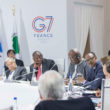In 1974, a squirrel trap in the attic of our big house in Scarsdale, New York, snagged a rat. My father took the rat out into the driveway, doused it with lighter fluid, and burned it alive right in front of me. I was 9.
It shocked me that my father—the son of impoverished immigrants, who had vaulted to the heights of the medical profession as an ophthalmic surgeon—could do something so barbaric. Why, I asked him. Why did you do that? All he said was that he had more experience with rats than I did. And in offering that enigmatic explanation, this genteel Southerner, a man who combined courtly manners with steely resolve, showed me an emotion I had never before seen in him: fear.
In retrospect, the incineration of that unfortunate rat was the first thread to come loose in the unraveling of my image of my father as a dauntless war hero. His valor was not in doubt. At 20, he had been the lead navigator for 650 B-17 bombers, setting the course as they flew from Italy to hit targets in Europe. His plane was shot down over Lintz, Austria, in 1945. He was later awarded the Distinguished Flying Cross for navigating a burning plane to complete its mission.
He spent the last three months of the war as a Jewish prisoner of war in Nazi Germany, a chapter that included injuring his back while parachuting out of the plane, getting beaten nearly to death for being a Jew, having his front teeth smashed out by a Nazi interrogator, becoming infested with lice, and losing 60 pounds. He foraged for food in garbage cans and ate bugs to stay alive.
And dealing with rats. . . . He hadn’t said that part out loud, but the picture emerged nonetheless. The prison camp, which he recalled as Stalag Luft III in Nuremberg, Germany, had been overrun by rats. My father, who wasn’t frightened when he’d been trapped in a flaming plane loaded with explosives and gasoline, was terrified of rats.
Like so many veterans of that war, my father hid his trauma. It revealed itself in bits and pieces over the ensuing years, starting with the rat. As I got older, I developed a fuller appreciation of what he had been through and how it had affected him. He was a real war hero, but like most heroes, his story was more complex than it seemed on the surface.
After my father’s death in 2016, my fascination with the war and the plane he flew only grew. This recently led me to sign up for the “Fans of the B-17” Facebook group. The group is mostly focused on the few B-17s still flying, but it also contains posts about the war and the men who fought in it.
I posted a photo of my father’s prisoner of war ID card, which he had grabbed from the prison camp office after the Germans fled in the face of Patton’s advancing 3rd Army. The post included some details about my father’s war record, where he was based, and his experiences at Stalag Luft III in Nuremberg.
Many of the group’s members liked the post and commented that my father was a real hero, a true member of “the greatest generation.” One member was not happy with me, however. He responded that I was “WRONG!” Didn’t I know that the ID card was from a central POW processing center, and that my father had actually been in Stalag Luft VII in Moosburg, Germany? (He could read German. I can’t.) He ended his acid note by saying, “WRONG INFORMATION IS WORSE THAN NO INFORMATION.”
As Steve Martin might have said, “Well, excuuuuuuuse me…” I dropped out of the group after taking umbrage at this dishonoring of my father’s memory. I wanted to say that I was sorry that my father’s recollections were inaccurate, but he was too busy being beaten and starved to record the correct Stalag data for your precious little group that obsesses over B-17 bombsights and landing gears. You could say that I was overreacting, but it still upset me.
The exchange also struck me as a microcosm of so many things that have gone off the rails here at home. We can’t talk civilly to one another, even about the simplest subjects. Why offer a polite correction when you can be a snotty troll? Why moderate your tone when you can scream? The same toxic dynamics on display on that Facebook page seem to be taking over almost every sphere of our society.
This person’s behavior also exemplified, at least to me, a trend among Americans, most of whom have never worn the uniform, of fetishizing military service—the hollow, hypocritical “Support our troops” rhetoric that’s so ubiquitous at professional sports events and other public settings. They’re fixated over the war and pander to veterans while utterly missing the point of the conflict and what we learned from it. That page offered many details of the B-17’s technical parameters but little real understanding of what the planes were used for or the fliers’ devastating experiences, and not much consideration for the people on the ground who got blown to bits by their bombs.
We’re losing the script when it comes to hearing the message of the greatest generation. As my father got older, like other veterans he acquired a more nuanced and complete understanding of the conflict. He was called to serve. He did his duty and got on with his life. He never owned a gun or pronounced himself superior to other Americans because he had been in the war. He would have hated the way the Army parades around at NFL games.
The B-17 group signifies how we have lost sight of what made the men and women of that generation special. These were people who understood sacrifice and what America stood for. In my father’s case, senior officers interceded with the Germans to save his life. As a Jew, he might not have been welcome in certain quarters of American culture, but in Stalag [fill in the blank] they were all Americans, no matter what. A little bit of that sentiment might go a long way in today’s downward-spiraling, hate-filled American society.
Theirs was a generation that, for all its faults, prized how to communicate and treat others with respect. Their greatness largely lies in what they accomplished after the war. They built enduring institutions. They endeavored to continue the American republic through times of great change, when it would have been so easy to say, forget it, let’s drop this whole democracy thing because it no longer serves our parochial interests. No, they did the opposite. They strengthened the system and opened it to participation by historically disfranchised sectors of the population.
As this generation passes from memory into history, we would be wise to remember what they fought against and what they really stood for and avoid jingoistic slogans and hollow tributes. It doesn’t matter what stalag my father was in. What counted was the way he lived his life when he came out, damaged as he was.
Hugh Taylor is a technology analyst and author of the book Digital Downfall: Technology, Cyberattacks and the End of the American Republic. Prior to working in the tech field, Hugh was a script development executive in primetime television. He studied filmmaking at Harvard University.




I’m curious about why your father wouldn’t approve of military men being honored at athletic games. I have a good idea but I don’t want to presume.
I connected to the feelings expressed by how we have separated ourselves from the human element of events. I’ve often been stunned when conversations with other people about a serious event only leads them to respond about artifacts of the event (like the plane and not all the surrounding trauma) or when they dismiss you in any way.
“Having wrong info over none is worse” is an insane response to your posting and for having endured that ? I feel your pain. It’s incredible how often some will discount the message of a story by focusing on a tiny fact that may or may not be accurate.
I’m not sure how to comment about the point of your story; the greatest generation’s message to us is being forgotten. I want to think upon that longer.